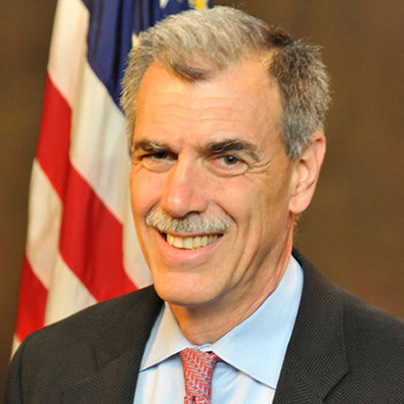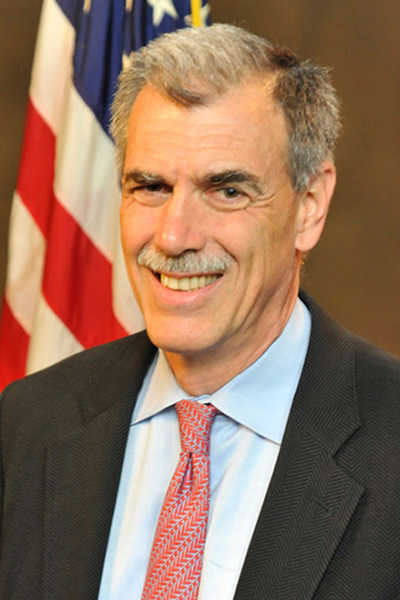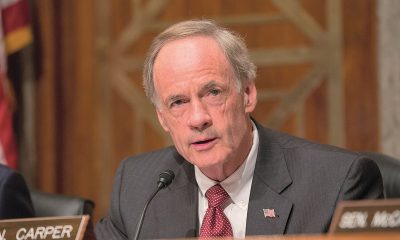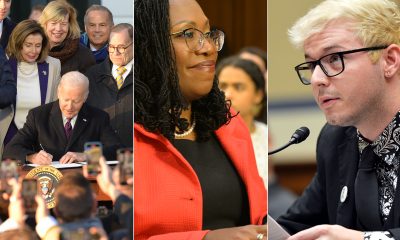National
Mixed reaction over Verrilli’s Prop 8 arguments
U.S. gov’t attorney doesn’t call for nationwide ruling in favor of marriage


Solicitor General Donald Verrilli’s arguments before the court on marriage are receiving mixed reviews. (Photo public domain)
The U.S. solicitor general’s performance before the Supreme Court on marriage is receiving mixed reviews amid disappointment that he didn’t overtly say same-sex marriage should be institutionalized nationwide as a result of the cases.
U.S. Solicitor General Donald Verrilli was the sole attorney who argued in both cases before the court — one on California’s Proposition 8, the other on the Defense of Marriage Act. The message was the same for both measures: Laws related to sexual orientation should be subject to heightened scrutiny, or a greater assumption they’re unconstitutional.
But the nuance in what Verrilli said should be the outcome of the Prop 8 case is noteworthy. Asked by Chief Justice John Roberts whether the administration wants a ruling that would strike down marriage bans across the country, Verrilli declined to give an affirmative answer.
“We are not taking the position that it is required throughout the country,” Verrilli said. “We think that that ought to be left open for a future adjudication in other states that don’t have the situation California has.”
Under later questioning, Verrilli said a state would have to reach a “very heavy burden” to justify a measure similar to Prop 8, but at the same time said a “caution rationale” — presumably a wait-and-see approach to same-sex marriage — would be “one place where we might leave it open.”
Suzanne Goldberg, a lesbian and co-director of Columbia University’s Center for Gender and Sexuality Law, said she was “uncomfortable” with Verrilli’s assertion that states may have justification to ban couples from marrying.
“He seemed to suggest that they might actually have a legitimate reason for maintaining the exclusion, and that did not seem necessary to me, given the arguments that he was making,” Goldberg said. “It did not feel right for the government’s attorney to suggest that their might actually be a plausible reason for a state to exclude same-sex couples from marriage.”
Goldberg drew a distinction between the arguments presented by the Justice Department in the Prop 8 and DOMA cases. For DOMA, Goldberg noted the administration hasn’t identified any instance in which the federal anti-gay law would be constitutional.
“That wasn’t the government’s position in the DOMA case even though the government said under the weakest standard of review, DOMA might be upheld,” Goldberg said. “But it did not suggest any of the rationales would be sufficient.”
It should be noted that Verrilli’s arguments in the Prop 8 case are consistent with the friend-of-the-court brief filed by the Justice Department against the California measure. The brief never explicitly says all bans on same-sex marriage are unconstitutional and instead focuses on Prop 8, which is the question before the court.
Richard Socarides, a gay New York-based advocate, said the presentation of that limited argument on marriage equality is not the fault of Verrilli — whom he said “did a good job” — but is the result of the White House making a political calculation on the Prop 8 case.
“I think that they made some political choices that were not the ones exactly I would have made,” Socarides said. “And I think that some of those came back to haunt them.”
Verrilli noted that California offers gay couples domestic partnerships, suggesting the court should rule that states offering some benefits to gay couples, but not marriage, should instead offer them marriage rights. Legal experts have coined this potential decision as the “nine-state solution.”
But Socarides questioned the wisdom of embracing that position, noting justices seemed disinclined to adopt a ruling saying states that offer some benefits to gay couples aren’t doing enough while leaving other jurisdictions unaffected.
“I think that argument is too clever by half,” Socarides said. “I appreciate the fact that I think the White House was trying to thread the needle there a little bit. It may have served its purpose, but I think in retrospect not the best decision.”
David Gans, civil rights director for the progressive Constitutional Accountability Center, found a positive in the limited argument presented by Verrilli: it provides another option to justices unswayed by American Foundation for Equal Rights attorney Ted Olson’s argument in favor of a fundamental right to same-sex marriage.
“In some ways, it was a very useful complement to the argument that Ted Olson made,” Gans said. “What Verrilli offered was sort of an alternative. Olson and Verrilli gave them a broader option as well as a narrow one that would decide this case, but not other cases. In light of some of the concern expressed by justices, in the end, it may prove valuable.”
Several legal experts and LGBT advocacy groups, including the Human Rights Campaign, declined to comment for this article.
Socarides emphasized the Justice Department has already stepped up to the plate in helping same-sex couples win their rights at the Supreme Court by dropping defense of DOMA and participating in the Prop 8 case.
“I would also emphasize that, I think at this point, we’re really quibbling around the edges and that we want to be very grateful for the work that the Justice Department did and for the president’s support,” Socarides said.
That was a sentiment shared by Evan Wolfson, president of Freedom to Marry, who commended the Justice Department for its work before the bench and in the briefs that were filed.
“Briefs speak louder than arguments, and the Solicitor General effectively dismantled every argument made in defense of excluding gay couples from marriage and inflicting unequal treatment on married gay couples under so-called DOMA,” Wolfson said. “He repeatedly urged the justices to focus on what is really going on: discrimination against gay people and indefensible denial of the freedom to marry, and when they go back and read his briefs in both cases, the justices will see a strong, clear path forward toward the freedom to marry and repudiation of the impermissible discrimination we have endured for too long.”
Pennsylvania
Malcolm Kenyatta could become the first LGBTQ statewide elected official in Pa.
State lawmaker a prominent Biden-Harris 2024 reelection campaign surrogate

Following his win in the Democratic primary contest on Wednesday, Pennsylvania state Rep. Malcolm Kenyatta, who is running for auditor general, is positioned to potentially become the first openly LGBTQ elected official serving the commonwealth.
In a statement celebrating his victory, LGBTQ+ Victory Fund President Annise Parker said, “Pennsylvanians trust Malcolm Kenyatta to be their watchdog as auditor general because that’s exactly what he’s been as a legislator.”
“LGBTQ+ Victory Fund is all in for Malcolm, because we know he has the experience to win this race and carry on his fight for students, seniors and workers as Pennsylvania’s auditor general,” she said.
Parker added, “LGBTQ+ Americans are severely underrepresented in public office and the numbers are even worse for Black LGBTQ+ representation. I look forward to doing everything I can to mobilize LGBTQ+ Pennsylvanians and our allies to get out and vote for Malcolm this November so we can make history.”
In April 2023, Kenyatta was appointed by the White House to serve as director of the Presidential Advisory Commission on Advancing Educational Equity, Excellence and Economic Opportunity for Black Americans.
He has been an active surrogate in the Biden-Harris 2024 reelection campaign.
The White House
White House debuts action plan targeting pollutants in drinking water
Same-sex couples face higher risk from environmental hazards

Headlining an Earth Day event in Northern Virginia’s Prince William Forest on Monday, President Joe Biden announced the disbursement of $7 billion in new grants for solar projects and warned of his Republican opponent’s plans to roll back the progress his administration has made toward addressing the harms of climate change.
The administration has led more than 500 programs geared toward communities most impacted by health and safety hazards like pollution and extreme weather events.
In a statement to the Washington Blade on Wednesday, Brenda Mallory, chair of the White House Council on Environmental Quality, said, “President Biden is leading the most ambitious climate, conservation, and environmental justice agenda in history — and that means working toward a future where all people can breathe clean air, drink clean water, and live in a healthy community.”
“This Earth Week, the Biden-Harris Administration announced $7 billion in solar energy projects for over 900,000 households in disadvantaged communities while creating hundreds of thousands of clean energy jobs, which are being made more accessible by the American Climate Corps,” she said. “President Biden is delivering on his promise to help protect all communities from the impacts of climate change — including the LGBTQI+ community — and that we leave no community behind as we build an equitable and inclusive clean energy economy for all.”
Recent milestones in the administration’s climate policies include the U.S. Environmental Protection Agency’s issuance on April 10 of legally enforceable standard for detecting and treating drinking water contaminated with polyfluoroalkyl substances.
“This rule sets health safeguards and will require public water systems to monitor and reduce the levels of PFAS in our nation’s drinking water, and notify the public of any exceedances of those levels,” according to a White House fact sheet. “The rule sets drinking water limits for five individual PFAS, including the most frequently found PFOA and PFOS.”
The move is expected to protect 100 million Americans from exposure to the “forever chemicals,” which have been linked to severe health problems including cancers, liver and heart damage, and developmental impacts in children.
An interactive dashboard from the United States Geological Survey shows the concentrations of polyfluoroalkyl substances in tapwater are highest in urban areas with dense populations, including cities like New York and Los Angeles.
During Biden’s tenure, the federal government has launched more than 500 programs that are geared toward investing in the communities most impacted by climate change, whether the harms may arise from chemical pollutants, extreme weather events, or other causes.
New research by the Williams Institute at the UCLA School of Law found that because LGBTQ Americans are likelier to live in coastal areas and densely populated cities, households with same-sex couples are likelier to experience the adverse effects of climate change.
The report notes that previous research, including a study that used “national Census data on same-sex households by census tract combined with data on hazardous air pollutants (HAPs) from the National Air Toxics Assessment” to model “the relationship between same-sex households and risk of cancer and respiratory illness” found “that higher prevalence of same-sex households is associated with higher risks for these diseases.”
“Climate change action plans at federal, state, and local levels, including disaster preparedness, response, and recovery plans, must be inclusive and address the specific needs and vulnerabilities facing LGBT people,” the Williams Institute wrote.
With respect to polyfluoroalkyl substances, the EPA’s adoption of new standards follows other federal actions undertaken during the Biden-Harris administration to protect firefighters and healthcare workers, test for and clean up pollution, and phase out or reduce use of the chemicals in fire suppressants, food packaging, and federal procurement.
Maine
Maine governor signs transgender, abortion sanctuary bill into law
Bomb threats made against lawmakers before measure’s passage

BY ERIN REED | On Tuesday, Maine Gov. Janet Mills signed LD 227, a sanctuary bill that protects transgender and abortion providers and patients from out-of-state prosecution, into law.
With this action, Maine becomes the 16th state to explicitly protect trans and abortion care in state law from prosecution. This follows several bomb threats targeting state legislators after social media attacks from far-right anti-trans influencers such as Riley Gaines and Chaya Raichik of Libs of TikTok.
An earlier version of the bill failed in committee after similar attacks in January. Undeterred, Democrats reconvened and added additional protections to the bill before it was passed into law.
The law is extensive. It asserts that gender-affirming care and reproductive health care are “legal rights” in Maine. It states that criminal and civil actions against providers and patients are not enforceable if the provision or access to that care occurred within Maine’s borders, asserting jurisdiction over those matters.
It bars cooperation with out-of-state subpoenas and arrest warrants for gender-affirming care and abortion that happen within the state. It even protects doctors who provide gender-affirming care and abortion from certain adverse actions by medical boards, malpractice insurance, and other regulating entities, shielding those providers from attempts to economically harm them through out-of-state legislation designed to dissuade them from providing care.
You can see the findings section of the bill here:
The bill also explicitly enshrines the World Professional Association of Transgender Health’s Standards of Care, which have been the target of right-wing disinformation campaigns, into state law for the coverage of trans healthcare:
The bill is said to be necessary due to attempts to prosecute doctors and seek information from patients across state lines. In recent months, attorneys general in other states have attempted to obtain health care data on trans patients who traveled to obtain care. According to the U.S. Senate Finance Committee, attorneys general in Tennessee, Indiana, Missouri, and Texas attempted to obtain detailed medical records “to terrorize transgender teens in their states … opening the door to criminalizing women’s private reproductive health care choices.”
The most blatant of these attempts was from the attorney general of Texas, who, according to the Senate Finance Committee, “sent demands to at least two non-Texas entities.” One of these entities was Seattle Children’s Hospital, which received a letter threatening administrators with arrest unless they sent data on Texas patients traveling to Seattle to obtain gender-affirming care.
Seattle Children’s Hospital settled that case out of court this week, agreeing to withdraw its Texas business registration in return for Texas dropping its investigation. This likely will have no impact on Seattle Children’s Hospital, which has stated it did not treat any youth via telemedicine or in person in Texas; the hospital will be able to continue treating Texas youth who travel outside of Texas to obtain their care. That settlement was likely compelling due to a nearly identical law in Washington that barred out-of-state investigations on trans care obtained solely in the state of Washington.
The bill has faced a rocky road to passage. A similar bill was debated in January, but after coming under intense attack from anti-trans activists who misleadingly called it a “transgender trafficking bill,” the bill was voluntarily withdrawn by its sponsor.
When LD 227 was introduced, it faced even more attacks from Gaines and Libs of TikTok. These attacks were followed by bomb threats that forced the evacuation of the legislature, promising “death to pedophiles” and stating that a bomb would detonate within a few hours in the capitol building.
Despite these threats, legislators strengthened both the abortion and gender-affirming care provisions and pressed forward, passing the bill into law. Provisions found in the new bill include protecting people who “aid and assist” gender-affirming care and abortion, protections against court orders from other states for care obtained in Maine, and even protections against adverse actions by health insurance and malpractice insurance providers, which have been recent targets of out-of-state legislation aimed at financially discouraging doctors from providing gender-affirming care and abortion care even in states where it is legal.
See a few of the extensive health insurance and malpractice provisions here:
Speaking about the bill, Gia Drew, executive director of Equality Maine, said in a statement, “We are thrilled to see LD 227, the shield bill, be signed into law by Gov. Mills. Thanks to our pro equality and pro reproductive choice elected officials who refused to back down in the face of disinformation. This bill couldn’t come into effect at a better time, as more than 40 percent of states across the country have either banned or attempted to block access to reproductive care, which includes abortions, as well as transgender healthcare for minors. Thanks to our coalition partners who worked tirelessly to phone bank, lobby, and get this bill over the finish line to protect community health.”
Destie Hohman Sprague of the Maine Women’s Lobby celebrated the passage of the bill despite threats of violence, saying in a statement, “A gender-just Maine ensures that all Mainers have access to quality health care that supports their mental and physical wellbeing and bodily autonomy, including comprehensive reproductive and gender-affirming care. We celebrate the passage of LD 227, which helps us meet that goal. Still, the patterns of violence and disinformation ahead of the vote reflected the growing connections between misogyny, extremism, and anti-democratic threats and actions. We must continue to advocate for policies that protect bodily autonomy, and push back against extremist rhetoric that threatens our states’ rights and our citizens’ freedoms.”
The decision to pass the legislation comes as the Biden administration released updated HIPAA protections that protect “reproductive health care” from out-of-state prosecutions and investigations.
Although the definition of “reproductive health care” is broad in the new HIPAA regulations, it is uncertain whether they will include gender-affirming care. For at least 16 states, though, gender-affirming care is now explicitly protected by state law and shielded from out-of-state legislation, providing trans people and those seeking abortions with protections as the fight increasingly crosses state lines.
****************************************************************************

Erin Reed is a transgender woman (she/her pronouns) and researcher who tracks anti-LGBTQ+ legislation around the world and helps people become better advocates for their queer family, friends, colleagues, and community. Reed also is a social media consultant and public speaker.
******************************************************************************************
The preceding article was first published at Erin In The Morning and is republished with permission.























